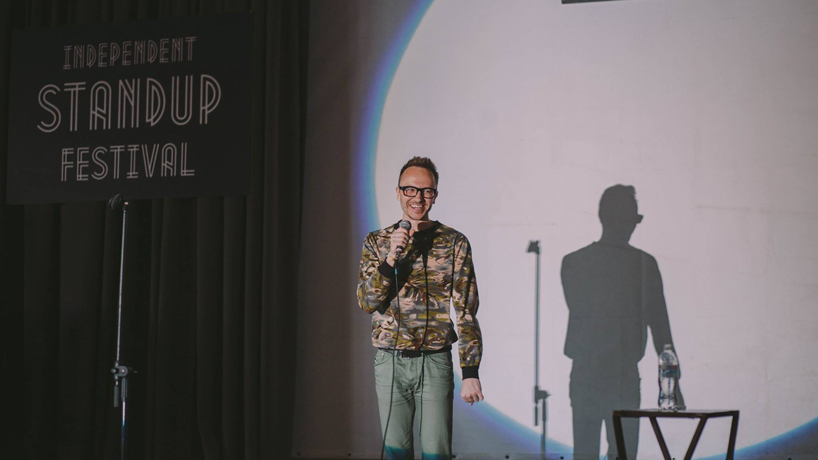
Pasha Zalutski, a native of Belarus and 2003 UMSL graduate, performs earlier this year at the Kiev Independent Standup Festival. He was chosen “Best Male Comedian.” (Images courtesy of Pasha Zalutski)
Pasha Zalutski walked determinedly onto the stage and shook hands with host Andrew Beburishvili as the spotlights flashed in all directions in the background.
Then he turned to the audience and the judges, pulled the microphone from its stand and launched into his set.
Zalutski, a 35-year-old native of Belarus who graduated from the University of Missouri–St. Louis in 2003 with a degree in communication, was debuting on the Russian television show “Otkryti Mikrofon,” which translates to “Open Mic” and has similarities to the former NBC show “Last Comic Standing.”
His first bit was about the importance of how people carry themselves, and he began with an observation that, because he looks nervous about getting his bag checked by security while riding the subway, he’s the one who always gets stopped.
“There’s a different way,” he told the crowd in Russian.
Then he deepened his voice and continued toward the punch line: “I should be like, ‘Sir, sir, you! The one in the uniform. You, you, you. I’m talking to you! Get over here right now and get to work! Don’t forget to pat me down. I ain’t paying taxes for nothing.’”
Zalutski paused briefly to soak in the laughter of the audience. He had their attention.
He was about to leave them in disbelief.
“See?” Zalutski said. “You gotta carry yourself right. Especially when you’re gay. Which I am.”
There was momentary silence, and the camera panned to judge Yuliya Akhmedova, whose jaw had dropped. She let out a low groan and began clapping her hands together slowly.
“But it’s not important. It’s not important,” said Zalutski, breaking the tension. “Let’s get back to talking about the subway.”
That set off another round of laughter and applause because, of course, particularly in Russia, being gay is not something that is taken lightly.
The lower house of the Russian Parliament unanimously approved a gay propaganda bill that President Vladimir Putin signed into law in 2013, and it criminalizes the distribution of “propaganda of nontraditional sexual relationships” among minors. It has served to crack down on public promotions of LGBT rights and culture, and critics say it also has been used as justification for violence against LGBT people.
Earlier this year in the Chechen Republic, security forces reportedly executed at least 27 gay men in one night in a suspected anti-gay purge.
Yet Zalutski was challenging those attitudes by choosing to out himself on a television network that claims an audience of more than 100 million people.
He credits his time at UMSL for the confidence to live openly, though his path to that stage was anything but direct.
◾
Zalutski’s face would make an odd fit on an “I Chose UMSL” billboard because the truth is he didn’t.
The U.S. Department of State made his choice for him. He was one of about 240 Belarusian students who applied for a scholarship to study in America as part of a broader exchange program for people from former Soviet republics. It is funded by the Freedom Support Act, a law created in 1992 to support freedom and open markets in the newly independent states.
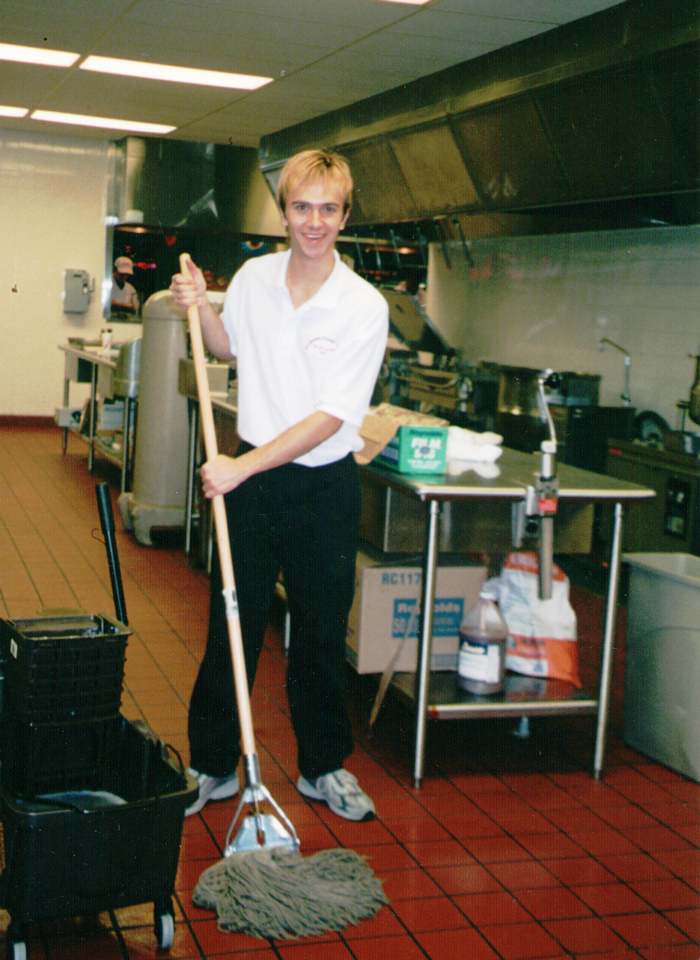
Zalutski worked part time as a custodian at the Millennium Student Center while pursuing his degree at UMSL.
There were six from his home country chosen in 2001, each one assigned a different one-year academic placement.
Zalutski felt fortunate to be one of them and was just as grateful to end up in a metropolitan area, even if all he knew of St. Louis was the Gateway Arch, which he’d read about in the Guinness Book of Records.
He found the UMSL campus – so different from the university buildings spread about town in the Belarusian capital of Minsk – a delight.
“It was the first year the Millennium Student Center had opened, so that was very nice to go to the Millennium Student Center as a central place,” he said recently while speaking via Skype from Minsk. “You could eat, play an arcade game, relax, get some entertainment, then you could go sleep on the couch for a little bit, go to the bank.
“Everything was so comfortable and cozy. It was just great. I had nothing to compare it to. I was very unspoiled. “
Zalutski probably would have been satisfied to land in just about any setting if it meant studying in the United States. It was the fulfillment of a childhood obsession he’d held since the age of 6.
That’s when he enrolled in a specialized school with daily English language lessons and the promise of being part a high school exchange program during his 11th grade year, though that promise would go unfilled after the collapse of the USSR.
No matter. Zalutski found a different way and was quickly taken with the freedom that studying at an American university provided – particularly when it came to choosing his own courses.
He’d been part of a rigidly structured law program during his first two years of college in Belarus and arrived in the United States expecting to study political science.
“Once I got to the United States, I felt free, and somebody tells me, ‘Look, you can choose your own courses,’” Zalutski said. “What am I going to choose, a course in sub-Saharan politics or a course in video production? Of course, my choice was video production. It sounded very creative.”
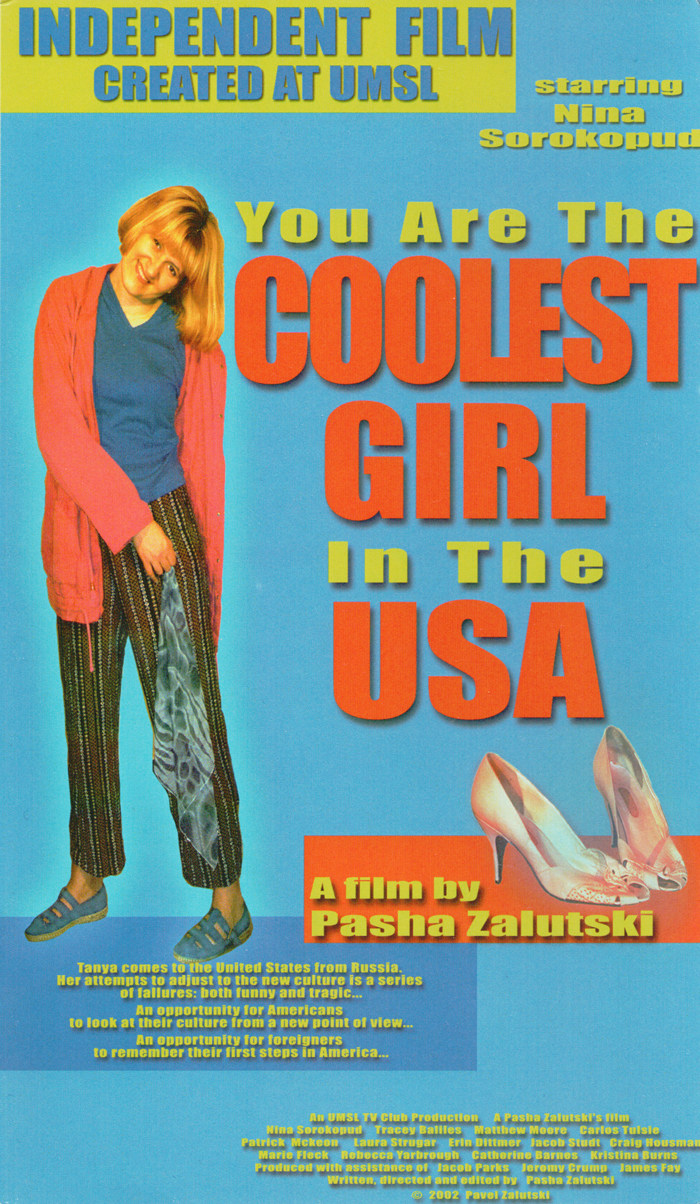
Zalutski’s short film, “You Are The Coolest Girl In The USA,” premiered at the Millennium Student Center in 2002. Zalutski made the film for a video production course, and you can watch it by clicking on the poster.
He put his own creativity on display in a course taught by Professor Jim Fay, creating a short film titled “You Are The Coolest Girl In The USA” about the experiences of a foreign student dealing with culture shock during her first months in the United States.
“I remember how ambitious it was, for one,” Fay said. “It carried over more than one semester, and he saw it all the way through. There were some times when I thought it wasn’t ever going to get finished, but he managed, and he did it all by himself.
“I mean he did recruit people to help him, but for the most part, all of the scripting and the editing and the directing and so on – he did that all himself.”
He also promoted it, getting backing from various organizations on campus, including the Residential Housing Association, Center for International Studies and Student Government Association, to premiere the film in the Pilot House.
Fay recalled being surprised at how many of Zalutski’s fellow students turned out for the event.
The 2002 film was just one highlight from Zalutski’s first year in the U.S., and he was determined to find a way to continue his studies after his scholarship ended.
He wound up petitioning Chancellor Blanche Touhill directly, and she arranged for him to be granted in-state tuition to make it economically feasible for him to finish his degree at UMSL. He helped support himself doing part-time work as a custodian at the MSC and in the office of the Department of Communication.
Zalutski continues to marvel at the kindness of people such as Fern Mreen, then the administrative associate in the Department of Communication, and also Professor Rita Csapo-Sweet, whom he described as a mentor.
“Just thinking about it, thinking back to those years when I was so taken care of,” he said. “It is amazing. Since then, it’s been adult life, and it’s been very different. Those are the golden years when I was most taken care of in my life.”
It was also at UMSL where Zalutski first began to be open about his sexual orientation.
Unlike in Minsk – where he had to keep his first romantic relationship secret from even his closest friends – he found himself welcomed out when two of his fellow residence hall residents invited him to a gay club only weeks into his first semester.
“That felt like a wall collapsed,” Zalutski said. “I didn’t even have to come out. They opened those doors for me and said, ‘Please, we’re waiting for you.’ I remember it was super easy to do that. And I felt accepted very early on.
“It was 2001. We didn’t have gay marriage back then and none of the LGBT protections, so it was pretty amazing.”
◾
Zalutski hoped to forge a career in entertainment after completing his bachelor’s degree in communication in May 2003.
He gained acceptance to a full-paid internship program put on by the Academy of Television, and it provided him the opportunity to do production assistant work on an NBC show.
He was just out of school, living in Los Angeles and might have seemed on a fast track to success in the industry.
But the internship proved a struggle. He had difficulty keeping track of details and schedules while assigned various errands to complete. He appeared forgetful, scattered.
Things didn’t get any easier after his internship ended, though his hosts helped him land a full-time production assistant position on another NBC series.
“I was fired in three days,” Zalutski said. “Nobody stomped their feet. People just told me, ‘We actually realized we don’t need a production assistant.’ They played it so cool. But I knew what was going on. I knew that I’m not good enough.”
The experience left him shaken.
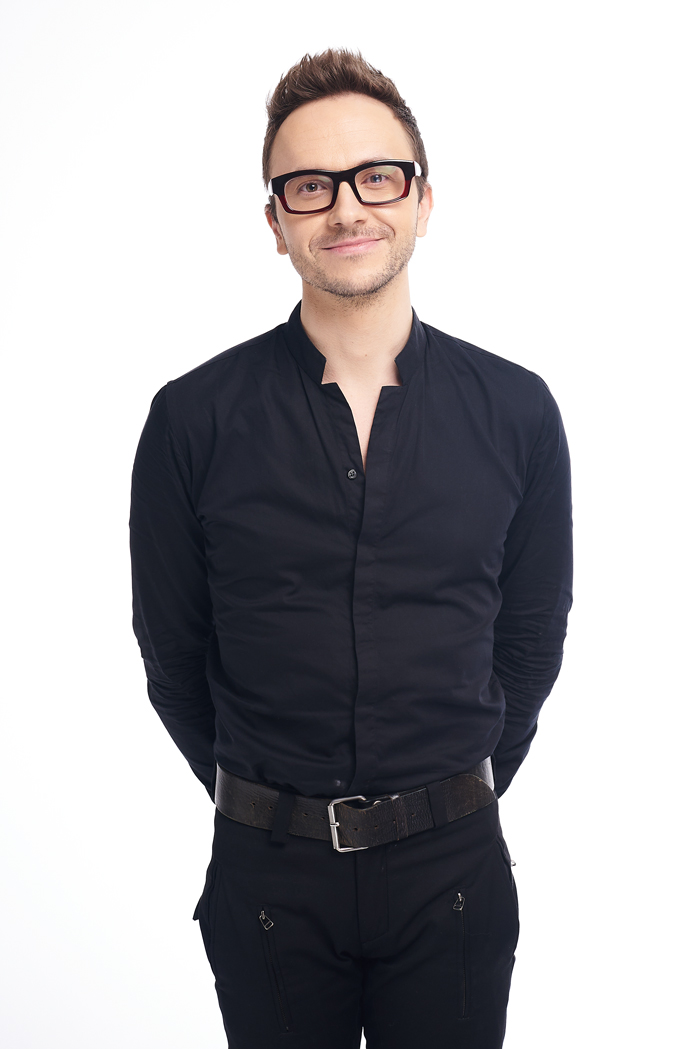
Zalutski’s first attempt at forging a career in the entertainment industry – as a production assistant – ended in failure.
Maybe things would have been different if he hadn’t cared enough and could have pointed to that as the source of his failure. But he desperately wanted to succeed and couldn’t figure out how to make it happen.
He lingered in Los Angeles two more years, looking for other chances to work in television or film, but found all the same problems because all the jobs seemed to be for candidates who were “detail-oriented” and “able to multitask.”
He became depressed and anxious until he finally gave up all together, leaving Los Angeles for Houston and a position working as a translator on an oil and gas project.
The job paid well, but he never did find the experience typing away his days in a cubicle rewarding.
So Zalutski abandoned that too, this time resettling in New York, where he became active in the Russian LGBT community.
In 2013, he helped organize the first-ever Russian-themed float in the annual New York City Pride March. The timing was apt when viewed alongside the propaganda ban being enacted in Russia.
“This is about being truly who you are in public,” Zalutski told Radio Free Europe at the time. “This is about getting on the float, putting on a glitzy costume, dancing to great music, greeting the crowds – just publicly, openly, unashamedly celebrating the fact that you can say to the entire world, ‘I’m gay.’”
He said such a statement would have been “impossible” back home.
Of course, that didn’t mean Zalutski wasn’t feeling a pull from the other side of the Atlantic after 12 years in the United States.
He was struggling to find security and fulfillment professionally while doing freelance work both as a translator and as a journalist, traveling around the country and gathering video for Russian television networks. He also missed the culture of Belarus.
He started making frequent visits back to Minsk while continuing to search for his place in the world.
It was during one of his trips across the ocean that Zalutski stumbled upon an online course about attention deficit hyperactivity disorder by noted Seattle-based psychotherapist Don Baker. It proved a lesson into his own mind, and it was life-changing.
For starters, Zalutski for the first time gained an understanding of why he failed during his time in Hollywood.
“I was never meant to be a production assistant,” he said. “It helped explain that it was not my fault that I couldn’t remember the schedules and helped explain that it’s pointless to work on your weaknesses because I’m never going to be detail-oriented, never going to be a multitasker.”
Instead, he began to examine his strengths.
◾
Zalutski had been a performer since early in his childhood.
He’d hosted the kindergarten graduation pageant, directed and acted in a play that won his middle school’s theater contest and continued seeking out opportunities to appear on stage throughout his high school years.
But when it came time for college, his parents steered him toward what seemed a more pragmatic career path.
After finally deciding to live in Minsk full time, Zalutski realized he also was meant to return to the stage and decided to give comedy a try.
Fay always envisioned Zalutski as a creative director during his time at UMSL, but he wasn’t shocked when he learned of his former student’s latest pursuits.
“I wouldn’t have thought comedy would have been his strongest attribute,” Fay said. “But as bright and articulate as he always has been and as observant as he is, it doesn’t come as a complete surprise to me.”
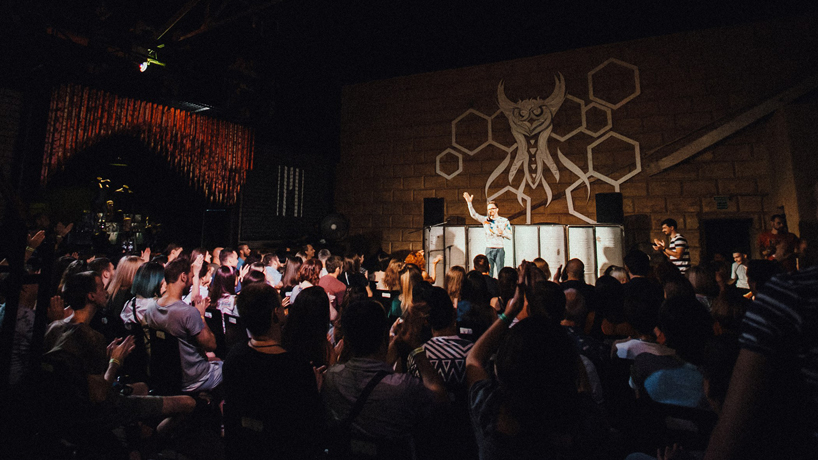
Zalutski appeared at his first open mic night in 2015. Two years later, he’s found himself entertaining audiences throughout the Russian-speaking world.
His first appearance at an open mic came on June 25, 2015.
“Looking back at my first performance, it was really naïve and very amateurish,” Zalutski said. “But when I tried it, everything just came together. It came together.”
He found an outlet to talk about all the things that challenged or ailed him in a way that was therapeutic.
“If you can laugh at it, you can deal with it,” Zalutski said while quoting the late comedienne and talk show host Joan Rivers, one of his biggest influences.
Anything he’d experienced, including his struggles with ADHD and the challenges that come with being gay, was fair game for discussion.
Zalutski has had much to learn about standup comedy. He’s introspective and observant but not always quick-witted or spontaneous. So it’s taken time for him to figure out how to turn all the thoughts compiled from his day-to-day experiences into jokes that could get an audience to laugh.
He’s taken cues from more seasoned members of the emerging standup comedy community in Minsk and also studied books about how to structure jokes.
He’s been dedicated to honing his craft and sets aside time each week to spend at Belarus’ national library, a short walk from his apartment. It’s been an ideal setting for writing and perfecting new material.
“It’s a fabulous glass building with so many diverse spaces to work,” he said. “You’re never bored.”
Zalutski has made steady progress in his performances over the past two years and caught the attention of producers of “Otkryti Mikrofon” when they were scouting the Russian-speaking world for comedic talent last year.
Eventually, he landed a spot on the show and the opportunity to work with its writers to further refine his material.
The decision to out himself was not one he made lightly. He consulted with friends in Minsk, well aware it could provide him with unwanted notoriety and upset the comfort he’s enjoyed since returning home.
“Somehow, we still decided that I should do it,” he said. “The desire to tell your story is just overwhelming. The desire to tell your story, to reach out to people, just to break free from the questions and to show yourself as you are to everyone at once – it was so seductive.”
He also believed he could entertain the audience and even provide an opportunity for catharsis. He insisted he was not tortured by his decision.
Zalutski’s only fear was whether he would be able to deliver the material to maximum effect, but that proved to be for naught.
“It was a great day,” he said. “Everything was right, I felt right on stage, and yes, the catharsis happened. It happened for me, for people in the audience and later, it happened – judging based on the comments that I’ve received – it happened for so many people who were watching.”
https://www.facebook.com/pashazalutski/videos/10158243419475154
The judges seemed to recognize the moment, too.
“The Open Mic TV show is genuinely about standup comedy, and the show is absolutely not subject to the country’s general direction,” judge Timur Karginov said in Russian at the conclusion of Zalutski’s initial performance. “It’s an alternative, and what we just saw wouldn’t be possible elsewhere.”
“Allow me to say that apart from being a very funny performance, it was also a very brave performance in the context of this country,” Akhmedova added. “You’re a brave man. I applaud you.”
The warm reaction has continued to be beyond anything he expected as he advanced to the third round of the show.
That success has led to other opportunities since as he’s developed his own standup show, “A I Am,” and brought it to Kiev, Ukraine; Prague, Czech Republic; and multiple cities in Russia, including eight shows in St. Petersburg and appearances in smaller industrial cities such as Vologda, Cherepovets and Penza. He was chosen Best Male Comedian at the Kiev Independent Standup Festival.
“I couldn’t predict that people would be so loving toward me,” he said. “Everywhere I go, whenever I get recognized, I feel love.”
He knows he still has room to improve as he refines and adds to his material and gains more experience on stage. But there’s comfort knowing that the years he’s spent searching for his place after leaving UMSL finally feel behind him.
“This is it,” Zalutski said. “I’m confident about saying that. I just can’t believe that I’ve finally found it.”
Media coverage
Mic.com
St. Louis Post-Dispatch















